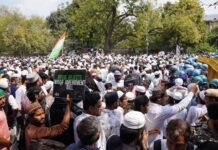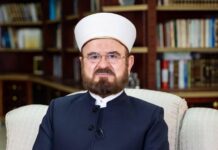Prominent American Muslim scholar Shaykh Hamza Yusuf has agreed to be part of a 10-member panel chosen by hawkish U.S. Secretary of State Mike Pompeo to examine the role of human rights in U.S. foreign policy.
Pompeo unveiled the “Commission on Unalienable Rights” last week, saying that it has been tasked with reviewing “the role of human rights in American public policy.”
“Today the language of human rights has become the common vernacular for discussions of human freedom and dignity all around the world … but words like ‘rights’ can be used for good or evil,” Pompeo said. “We must therefore be vigilant that human rights discourse not be corrupted or hijacked or used for dubious or malignant purpose.”
Shaykh Hamza, who co-founded the Zaytuna College in California, will be joined on the commission by the Zionist Rabbi Meir Yaakov Soloveichik; Stanford professor Russell Berman; Notre Dame Law professor Paolo Carozza; Harvard sociologist Jacqueline Rivers; Katrina Lantos Swett, former chair of the U.S. Commission on International Religious Freedom; philosopher Christopher Tollefsen; and UC Irvine professor David Tse-Chien Pan.
The scholar has received harsh criticism from within the U.S Muslim community for his decision.

“Despite Sheikh Hamza Yusuf’s rich, robust and arguably unparalleled contributions to Islamic thought in the West, it pains me to see him collaborate with the most Islamophobic administration in American history,” said Hamzah Raza, a graduate student in Islamic studies at Harvard Divinity School. “Donald Trump is a president who asserted that ‘Islam hates us’ and incited violence against Muslims as a tool to get elected.”
“Whatever (people) think of Hamza Yusuf joining Trump’s Human Rights panel, the real point is to remember that these councils are a waste of time,” Imam Shadee Elmasry tweeted. “(A)re these panels effective and haven’t we passed the point of no return with this administration? A point where we wouldn’t come near them. Most have said we passed that a long time ago.”
Subscribe to our newsletter and stay updated on the latest news and updates from around the Muslim world!
Yusuf’s participation in the commission is “disappointing and disturbing,” said Shabana Mir, an assistant professor of anthropology at the American Islamic College. His “alliance with dictatorial Arab states and monarchs is also disturbing, and this is of a piece with that,” she added.
Yusuf has long drawn criticism for his work advising the Bush administration post-9/11, as well as for his work as vice president of the Forum for Promoting Peace in Muslim Societies, an institution sponsored by the United Arab Emirates.
His involvement in the Forum for Promoting Peace in Muslim Societies has softened his political stances almost beyond recognition, scholars say.

“Over the years, Hamza Yusuf has centralised the idea of stability and government as the central ideal and that Muslims should not politically engage but ensure that their hearts are clean,” Walaa Qusaiy, who teaches at the University of Birmingham and has researched Yusuf’s evolving political thought, told the Middle East Eye this week. “But when governments then use this narratives to affirm the supremacy of the state and regime then it becomes a problem.”
Hamza Yusuf has declined to comment about the matter to the media, but the co-founder of Zaytuna College, Imam Zaid Shakir, released the following statement on Facebook.
“Let Us Pray for Shaykh Hamza. The appointment of Shaykh Hamza Yusuf to the United States State Department’s ‘Commission on Unalienable Human Rights’ has spawned something of an online controversy. Without getting into the political implications of the issue, let me say that like many people I do not agree with everything Shaykh Hamza may say or do, and I am sure he would say the same concerning me. That does not mean he is no longer my Muslim brother, and that all of the rights accruing to brothers and sisters in Islam are somehow stripped away from him.
“Despite disagreements one should continue to entertain a good opinion of one’s brother, trust and respect his knowledge (if like Shaykh Hamza he is of the people of knowledge), extend sincere advice to him and most importantly to pray for him.
“So I encourage my brothers and sisters to join me in praying that Shaykh Hamza is protected from the evil of men and jinn. I pray that he is able to give honest, Islamically-informed advice to those who seek it, and that they heed it. I pray that he is blessed with wise and judicious counsel from those he may consult. I pray that Allah guides his tongue when he speaks and grants him the courage, honesty and integrity to never swerve from speaking the truth, even in the face of tyrants.
“My Nasiha (advice) would be that if he finds that the position he has assumed does not allow him to be open, honest and effective in the advice he proffers that he resigns with his dignity and honor intact.
“May Allah bless Shaykh Hamza and reward him greatly for the service he has rendered to the Muslim community over many long decades. Over the span of that time many who condemn him today saluted him yesterday. May Allah bless us all to see eye-to-eye tomorrow.
“And remember the Grace of Allah upon you when you were enemies and He bound your hearts together, so that you became –by His Grace– brothers…” Qur’an 3:103






















